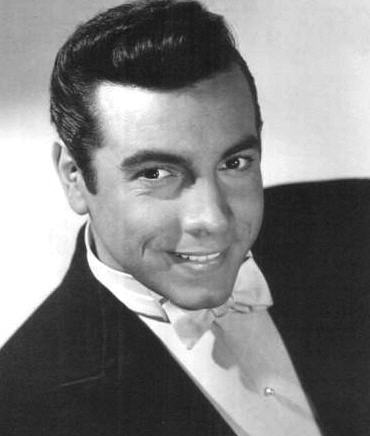
Mario Lanza
Mario Lanza (US: /ˈlɑːnzə, ˈlænzə/ LA(H)N-zə, Italian: [ˈmaːrjo ˈlantsa]; born Alfredo Arnold Cocozza [alˈfreːdo koˈkottsa]; January 31, 1921 – October 7, 1959) was an American tenor and actor. He was a Hollywood film star popular in the late 1940s and the 1950s. Lanza began studying to be a professional singer at the age of 16. After appearing at the Hollywood Bowl in 1947, Lanza signed a seven-year film contract with Louis B. Mayer, the head of Metro-Goldwyn-Mayer, who saw his performance and was impressed by his singing. Prior to that, the adult Lanza sang only two performances of an opera. The following year (1948) he sang the role of Pinkerton in Puccini's Madama Butterfly in New Orleans.[1]
Mario Lanza
His film debut for MGM was in That Midnight Kiss (1949) with Kathryn Grayson and Ethel Barrymore. A year later, in The Toast of New Orleans, his featured popular song "Be My Love" became his first million-selling hit. In 1951, he starred as tenor Enrico Caruso, his idol, in the biopic The Great Caruso, which produced another million-seller with "The Loveliest Night of the Year" (a song which used the melody of Sobre las Olas). The Great Caruso was the 11th top-grossing film that year.[2]
The title song of his next film, Because You're Mine, was his final million-selling hit song. The song went on to receive an Academy Award nomination for Best Original Song. After recording the soundtrack for his next film, The Student Prince, he embarked upon a protracted battle with studio head Dore Schary arising from artistic differences with director Curtis Bernhardt, and was eventually fired by MGM.[3]
Lanza was known to be "rebellious, tough, and ambitious".[4] During most of his film career, he suffered from addictions to overeating and alcohol which had a serious effect on his health and his relationships with directors, producers and, occasionally, other cast members. Hollywood columnist Hedda Hopper writes that "his smile, which was as big as his voice, was matched with the habits of a tiger cub, impossible to housebreak." She adds that he was the "last of the great romantic performers".[5] He made three more films before dying of an apparent pulmonary embolism at the age of 38. At the time of his death in 1959, he was still "the most famous tenor in the world".[6] Author Eleonora Kimmel concludes that Lanza "blazed like a meteor whose light lasts a brief moment in time".[7]
Personal life[edit]
Lanza's friend Bert Hicks introduced him to his sister, Betty Hicks. Lanza and Betty began dating, and the couple were married by a judge at the Beverly Hills city hall on April 13, 1945.[28] They had four children: Coleen (born December 9, 1948),[29] Ellisa[30] (born December 3, 1950), Damon (born December 12, 1952), and Marc (born May 19, 1954).[29]
Lanza died on October 7, 1959, and his wife died on March 11, 1960. The coroner's report stated Betty Lanza had a high level of alcohol and Seconal in her system.[30]
After the death of both parents Mario Lanza's mother, Maria Lanza Cocozza, became the orphaned children's guardian.[31]
Legacy[edit]
Musical legacy[edit]
Lanza was the first RCA Victor Red Seal artist to win a gold disc and the first artist to sell two and a half million albums.[35] He was referred to by some sources as the "new Caruso" after his "instant success" in Hollywood films,[36] while MGM hoped he would become the movie studio's "singing Clark Gable" for his good looks and powerful voice.[4] He was a big inspiration to fellow RCA Victor recording star Elvis Presley. A year after Lanza's death, Presley recorded an English translation of "O Sole Mio", which was popularized by Lanza. This song, "It's Now or Never", went on to be one of Presley's all-time best selling songs.[37]
In 1994, José Carreras paid tribute to Lanza during a worldwide concert tour, saying, "If I'm an opera singer, it's thanks to Mario Lanza."[38] Plácido Domingo stated, "Lanza's passion and the way his voice sounds are what made me sing opera. I actually owe my love for opera...to a kid from Philadelphia."[39]
Because he appeared on the operatic stage only twice, many critics felt that he needed to have had more "operatic quality time" in major theaters before he could be considered an opera star. His films, especially The Great Caruso, influenced numerous future opera stars, including Joseph Calleja, José Carreras, Plácido Domingo, Luciano Pavarotti, and Vyacheslav Polozov.[40][6] According to opera historian Clyde McCants, "Of all the Hollywood singers who performed operatic music...the one who made the greatest impact was Mario Lanza."[41] Hollywood gossip columnist Hedda Hopper concluded that "there had never been anyone like Mario, and I doubt whether we shall ever see his like again".[5]
Portrayal on screen and stage[edit]
A 90-minute PBS documentary, Mario Lanza: The American Caruso, hosted by Plácido Domingo and featuring Lanza's family and professional associates, was released in 1983, and nominated for a Primetime Emmy for Outstanding Informational Series or Special that same year. In October 2007, Charles Messina directed the musical Be My Love: The Mario Lanza Story, written by Richard Vetere and produced by Sonny Grosso and Phil Ramone, about Lanza's life. It premiered at The Tilles Center for the Performing Arts in Greenvale, New York.[42]